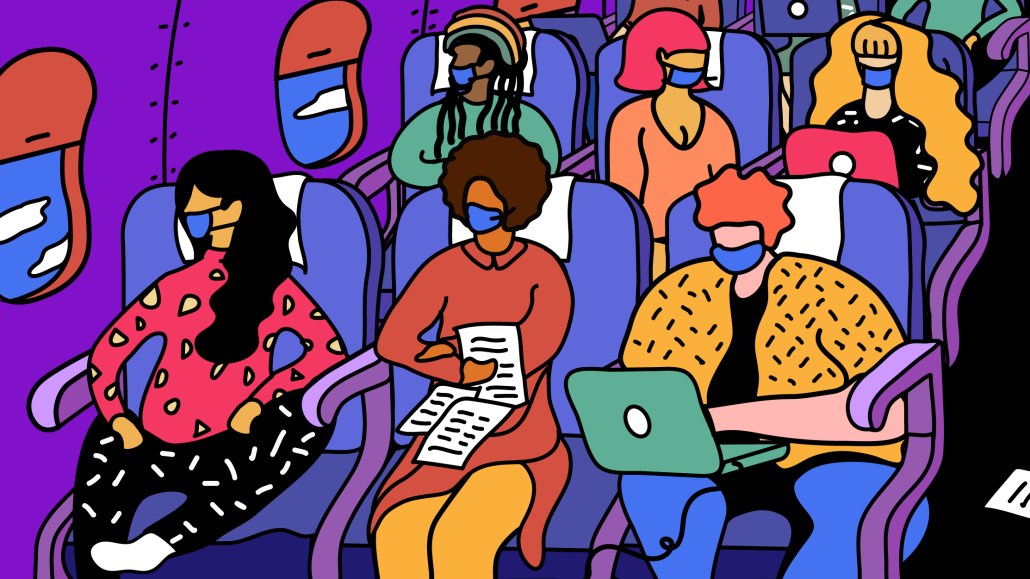Save 50% on a 3-month Digiday+ membership. Ends Dec 5.
‘This is an opportune time’: Why remote work could help agencies hire and support more diverse talent

This is part of a special package from Digiday about what comes next, looking to the other side of the current crisis to explore the lasting changes that are coming about.
Five months ago, agency employees adapted to working remotely due to the coronavirus. In the months since then, following the death of George Floyd and the on-going protests in support of Black Lives Matter across the country, there’s been a renewed focus on the diverse makeup of agencies.
Indeed, the coronavirus and the Black Lives Matter movement have coalesced to allow for a moment of reflection at agencies, according to agency executives, who say that as remote work is starting to become the new normal there’s a possibility that agencies could in turn become more diverse. Put simply, without geographic restrictions, agencies could cast a wider net while hiring and, in doing so, find candidates of more diverse backgrounds, said agency executives who added that before the coronavirus they were less likely to approve of hiring remote workers.
“Remote work has become an important part of our lives and has huge potential to bring more diversity into the fold,” said Andrea Diquez, CEO of Saatchi & Saatchi in New York. “Major cities are expensive, and many people don’t have the economic opportunity to uproot for the job they want. Being location-agnostic would allow agencies across the board to hire more people from diverse backgrounds. It’s important that we use this moment as an opportunity to make that happen.”
It’s not just agencies based in expensive cities like New York or Los Angeles that may be able to expand the candidate pool by allowing remote hiring. Agencies in smaller cities or more rural areas are also able to tap into potential employees outside of their area who are uninterested in moving but could still work for that agency. While agency executives haven’t fully committed to changing their hiring policies to allow for remote employees for positions, some are warming up to it.
David DeMuth, CEO of Detroit-based Doner is among the agency executives changing his tune. Before the on-set of the coronavirus, the agency hired a new director-level employee who was planning to move to Detroit but has yet to do so as the virus hit around the time he was hired. The ability to on-board a senior employee remotely as well as the agency team working remotely has DeMuth warming up to remote hiring.
“We’ve proven that remote work is working,” said DeMuth. “That opens up the talent pool which opens up diversity. If you open up the geography, you decrease the confines of ‘in order to work here you must move here’ that opens up more talent for your company. Moving can be a dealbreaker for people; now we might not require someone to move.”
Ad position: web_incontent_pos1
Agencies are now starting to look at “programs and recruiting strategies they have not tried before” to hire remote talent, according to Simon Fenwick, executive vice president of talent, equity and inclusion at the 4A’s. “However, there is still a concern about how talent will be on-boarded, engaged and ensured that their agencies are inclusive while remote — and especially if they are the only person of color,” said Fenwick. “More than ever, work being done around inclusivity and culture is on the agenda of agencies.”
Create new systems
Even so, some are skeptical that simply allowing agencies to hire remote candidates will make a true dent in agencies diversity issues. Caveat co-founder and managing director Josh Greenberg doubts the ability to hire remotely will have a “significant impact on diversity” as, in his estimation, the “only thing that’s going to drastically impact the issue of diversity is putting more focus on the problem and companies of all sizes being held accountable.”
In recent weeks, Black agency employees and new organizations like 600 & Rising have worked to put that focus on the problem of diversity at agencies. Doing so has led to holding companies as well as 30-plus independent agencies revealing their diversity numbers and committing to make a change to improve those numbers.
While a commitment to hiring remote candidates has not been part of that pledge, agency executives and industry observers believe that remote hiring could help agencies improve the diversity of their agencies.
Ad position: web_incontent_pos2
“This is an opportune time, albeit one that was completely unforeseen, to truly create new systems that support diverse work spaces and cultures, by offering remote and hybrid options, developing anti-biased systems that allow talent vulnerable to ‘other-ism’ (ageism, sexism, sizeism, racism, etc.) an equal opportunity,” said Ericka Riggs, foundation and inclusion director at the Ad Club.
Riggs continued: “If there is a silver lining to come out of this tragedy, it will be that companies gain competitive advantages by intentionally rebuilding with the guiding principles of diversity, equity, and inclusion, which has been proven to drive greater outcomes for profit and for the culture.”
More in Marketing

Ulta, Best Buy and Adidas dominate AI holiday shopping mentions
The brands that are seeing the biggest boost from this shift in consumer behavior are some of the biggest retailers.

U.K. retailer Boots leads brand efforts to invest in ad creative’s data layer
For media dollars to make an impact, brands need ad creative that actually hits. More CMOs are investing in pre- and post-flight measurement.
Ad position: web_bfu